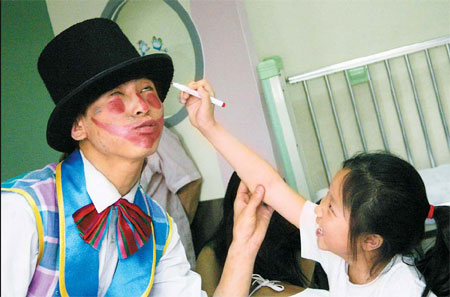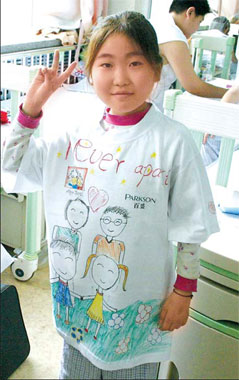The Magic touch
|
A child plays with Li Zhongbao at Ertong Hospital. |
Doctors at Beijing's largest children's hospital studied medicine, the nurses attended college and then there is Li Zhongbao. He graduated from clown school.
Stomping around in big shoes, wearing colorful clothes and led by his funny red nose, Li is obviously not an official staff member of Ertong (Children's) Hospital. But he is one of its most popular people.
Li is part of group of expats and local Chinese volunteering their time to add a little magic to the lives of children recovering in hospital.
German Claudia Vogg started Magic Hospital in the Chinese capital in 2003 and the movement has quickly grown with a new branch opening in Shanghai and more projects developing.
One special program is called Abracadabra, which grants a wish to seriously ill children.
"A young boy was hit by a car and severely injured," says fellow German Constanze Maronde, coordinator of Magic Hospital in China.
"All he wished for was to see his grandparents. They were far away from Beijing living in the countryside, so we managed to fly them in and set them in a hotel so they could reunite. It was really touching."
|
A girl displays the T-shirt she painted during a T-shirt day at Ertong Hospital. Photos by Tamara Gomez |
Another Magic Hospital event is T-shirt day. Sick children are given a T-shirt and coloring markers and are encouraged to design a new creation.
But many of the youngsters don't want to spoil their brand new beautiful gift.
At the hospital, a little girl spends some 10 minutes practicing her pattern on blank paper before she carefully starts painting the T-shirt. "I don't want to do it wrong," she says.
But the end result is wonderful.
"Bringing fun and laughter to kids is like an addiction," Maronde confesses. "Once you try it you can't stop." Maronde has lived in Beijing for two years now and took over as Magic Hospital China's coordinator last November. "It's a lot of work, but overall, it's gratifying," she says.
The T-shirt day concept was born three years ago and was the brainchild of two volunteers. Today it is a huge event attracting more than 200 volunteers across three locations all around China.
Maronde says Magic Hospital has attracted private donations but as the organization grew, more sponsors joined to support special events, such as T-shirt day.
"Sometimes there are people who have something to give, but they don't know who should they give it to, so they trust Magic Hospital as a connecting link to deliver to people in need," she says.
In Beijing, Maronde is in charge of foreign volunteers, who work side by side with Chinese volunteers. The split is 50/50, she says. It is a real multicultural group, with members coming from all over the world.
Volunteers meet once a month and prepare other special events, such as the Music and Art programs at a migrant workers' children school. There is also an English teaching program.
Although expats were the driving force behind the group, Maronde says more Chinese are getting involved. "The awareness of charity in China is growing fast," she says. "Talking from my experience I can say Chinese have a very open heart when they feel they can help."
Dragana Licina is one of these people offering her time and effort to help others. The 24-year-old Serbian woman joins volunteers at Ertong Hospital to prepare for the T-shirt painting session. She is excited because it is her first time helping out on this project. But it's not her first time as a volunteer.
"I'm active in volunteering in pediatric oncology in my country. I'm also part of an association that works with children with cancer and their parents," she says.
Dragana has been living in the capital for three months, studying Chinese at Tsinghua University and she wants to spend time with children in need.
"Kids were interested but I felt that no matter how much we tried to communicate in Chinese, they didn't expect a grown-up with speech problems," she laughs.
"It was a game for us and for them to understand, a big effort but fruitful. Kids enjoyed painting the T-shirts, and all of them wanted to do Fuwa (mascots for the Beijing Olympics).
"I do not see them as sick children even though they are, in fact. In the end they are just kids as any other in the world that want to play and are willing to learn through the games."
Nurses announce the session is over as the kids need some rest before dinner, after all the excitement.
"The work couldn't be done without the outstanding collaboration of the hospital nurses," says Maronde while saying goodbye to the children and to the hospital staff.
"We come, we do our thing and we leave, but they are the ones making our job possible and easy. We really have to thank them for that."
The volunteers leave and Li Zhongbao finishes his weekly clown tour at the hospital. The kids wave goodbye. They are wearing their new T-shirts, are laughing and beaming with smiles.
The smile is the aim of Magic Hospital because as they say, making a single kid happy is definitely the best reward of all.
(China Daily 07/14/2008 page10)
















